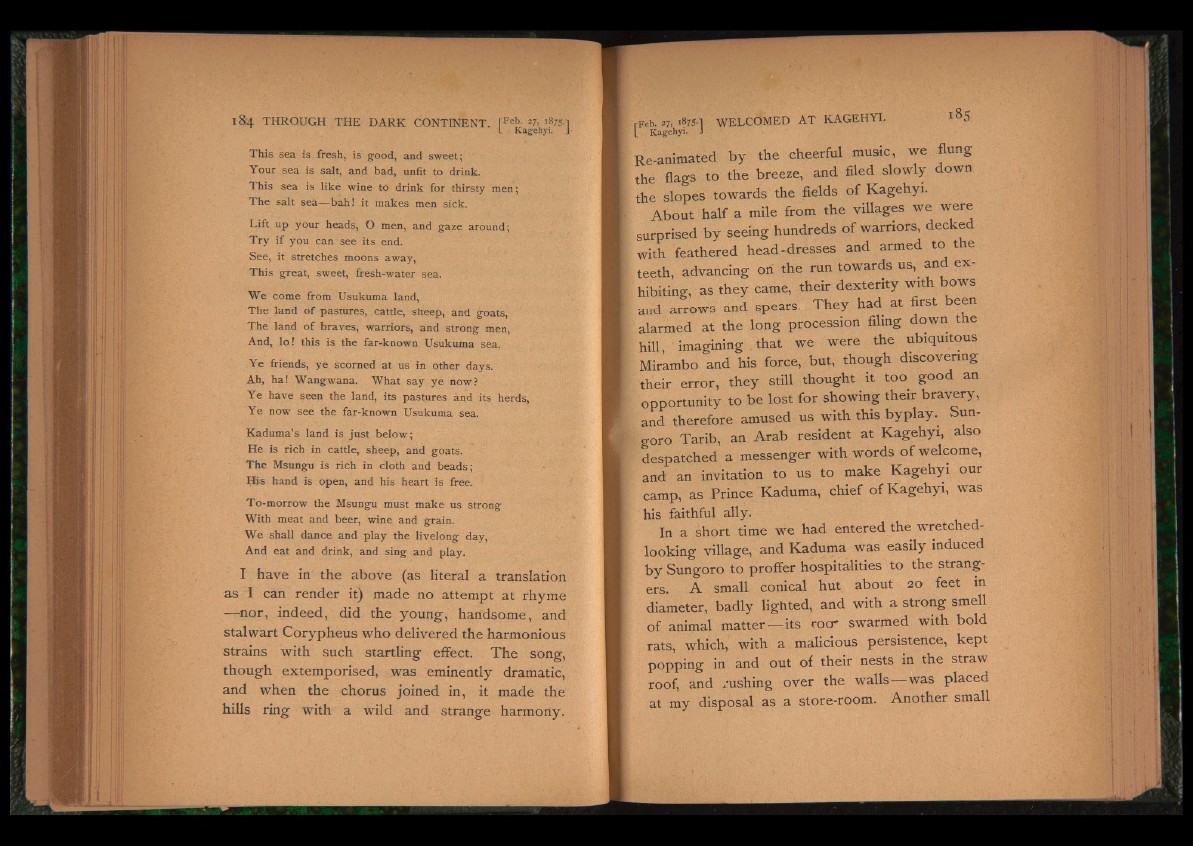
This sea is fresh, is good, and sweet;
Your sea is salt, and bad, unfit to drink.
This sea is like wine to drink for thirsty men;
The salt sea— bah! it makes men sick.
Lift, up your heads, O men, and gaze around;
Try if you can see its end.
See, it stretches moons away,
This great, sweet, fresh-water sea.
We come from Usukuma land,
The land of pastures, cattle, sheep, and goats,
The land of braves, warriors, and strong men,
And, lo! this is the far-known Usukuma sea.
Ye friends, ye scorned at us in other days.
Ah, ha! Wangwana. What say ye now?
Ye have seen the land, its pastures and its herds,
Ye now see the far-known Usukuma sea.
Kaduma’s land is just below;
He is rich in cattle, sheep, and goats.
The Msungu is rich in cloth and beads;
Hi« hand is open, and his heart is free.
To-morrow the Msungu must make us strong
With meat and beer, wine and grain.
We shall dance and play the livelong day,
And eat and drink, and sing and play.
I have in the above (as literal a translation
as I can render it) made no attempt at rhyme
— nor, indeed, did the young, handsome, and
stalwart Corypheus who delivered the harmonious
strains with such startling effect. The song,
though extemporised, was eminently dramatic,
and when the chorus joined in, it made the
hills ring with a wild and strange harmony.
rFeb. 27, 1*75-1 WELCOMED AT KAGEHYI. 185
L K a g eh y i. J
Re-animated b y the cheerful music, we flung
the flags to the breeze, and filed slowly down
the slopes towards the fields of Kagehyi.
' About half a mile from the villages we were
surprised b y seeing hundreds o f warriors, decke
with feathered head-dresses and armed to the
teeth, advancing on the run towards us,_ and e x hibiting,
as they came, their dexterity with bows
and arrows and spears. T h e y had at first been
alarmed at the long procession filing down the
hill, imagining that we were the ubiquitous
Mirambo and his force, but, though discovering
their error, they still thought it too good an
opportunity to be lost for showing their bravery,
and therefore amused us with this b yp la y . Sun-
goro Tarib, an Arab resident at K a g eh y i, also
despatched a messenger with words o f welcome,
and an invitation to us to make K a g eh y i our
camp, as Prince Kaduma, chief o f Kagehyi, was
his faithful ally.
In a short time w e had entered the wretched-
looking village, and Kaduma was easily induced
b y Sungoro to proffer hospitalities to the strangers.
A small conical hut about 20 feet in
diameter, badly lighted, and with a strong smell
o f animal matter— its rocr swarmed with bold
I rats, which, with a malicious persistence, kept
popping in and out of their nests in the straw
roof, and rushing over the walls— was placed
at my disposal as a store-room. Another small